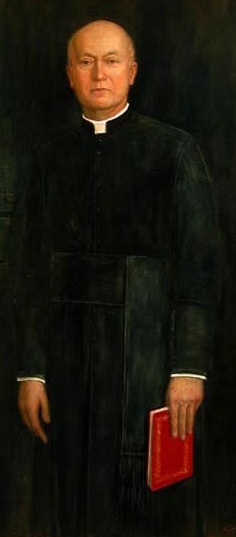

FROM THE PASTOR
by Fr. George W. Rutler
October 26, 2008
Although city parishes are not commonly thought of as "family oriented" the way suburban parishes are, and while urban conditions make it costly and difficult to rear children, it is gratifying to welcome a steadily increasing number of families to our parish and to baptize the children of couples married here. Pope Leo XIII called the family "the cradle of civil society" and said that the destiny of states is largely fostered in the circle of family life.
As a reminder of the sanctity of the family as the "little church" or "ecclesiola," last Sunday the Church beatified the parents of St. Thérèse of Lisieux, who was canonized in 1925. Beatification is the last degree before canonization. The ceremony took place in the basilica of Lisieux, according to the preferred practice of Pope Benedict to have the beatification rite in the place where the blessed ones lived. Louis and Zélie Martin were not beatified because their daughter is a famous saint. Their own heroic virtue was attested by a miracle required in the beatification process: In this case, their intercession healed a man's malformed lung. Their earthly lives were outwardly ordinary, typical of a French bourgeois family in the nineteenth century. Louis was a prosperous watchmaker. He had wanted to be a monk, and needed the counsel of a priest to explain the sanctity of fatherhood. They were married in Alençon in 1858 and never ceased exchanging love letters. Five of their nine children joined religious orders. Their daughter, Saint Thérèse, wrote, "The good God gave me a father and a mother more worthy of heaven than of earth." After Zélie's death, Louis worked hard to care for his children with a contagious happiness.
There has been a widespread breakdown of family life in our society, due to many reasons including a loss of a sense of the holiness of marriage, worsened by government policies that threaten family stability. It is widely recognized that welfare programs begun in the 1960s backfired in their attempt to help children. Today this is worsened by civil attempts to redefine marriage against the natural law. Nonetheless, there is a desire on the part of many not to repeat the mistakes of the past. Many young couples have learned the importance of families the hard way, often through the failures of the last generation. In one recent five-year period for which there are statistics, couples with three or more children increased from 11.4% to 18.4%.
It may take a long time to repair to the damage done to society by misguided social engineers who scorned the traditional family, but the Church lives by the vision expressed by Pope Pius XI at a time when a fascist government tried to usurp the role of parents: "The family is more sacred than the state, and men are begotten not for the earth and for time, but for heaven and eternity."




